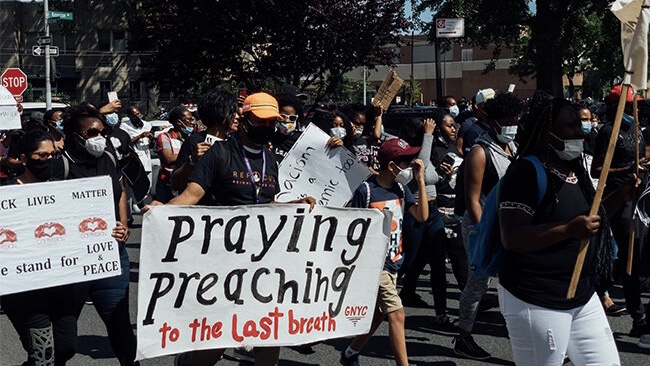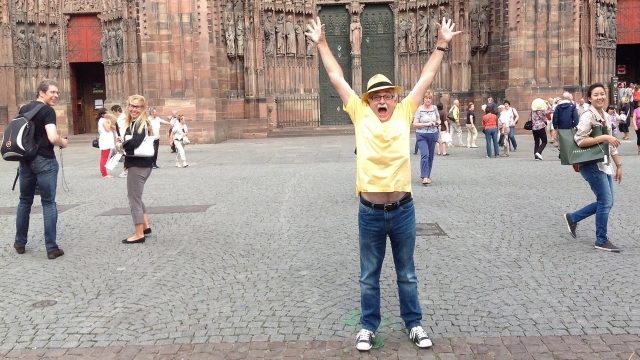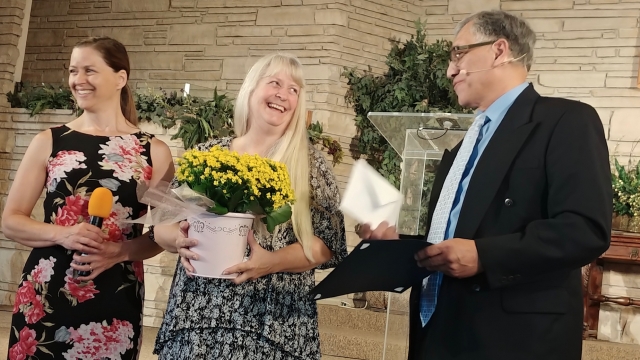By José Cortes, Jr. . .“But Pastor, is it okay to protest?”
“Did Jesus ever do it? Didn’t He just preach the Gospel and didn’t waste His time doing that?”
“Doesn’t Ellen White say that we cannot involve ourselves in this type of thing?”
“Don’t you think we should stop wasting our precious time in distractions such as these and preach the Three Angels Message?”
“This is all politics.”
These are some questions and comments we have heard during the last few weeks. Actually, some of these, we have heard for years now. They come from colleagues, family members, brothers, and sisters in our churches, and others. Interesting, that as Adventists, with protestant roots, we have to ask the question, if it is OK to protest.
So let’s start with Jesus; after all, He is the one we should always begin with. He is the One Ellen White would have started with. After that, we will deal with the early church and its pioneers, and we will end with our church today.
How did Jesus respond to discrimination and racism?
During the time of Jesus, there was discrimination and racism. Discrimination came in many different forms: it was religious, social, economic, gender, and racial. The poor, prostitutes, publicans, women, lepers, and gentiles were all discriminated against. The Samaritans, perhaps, is an excellent example of racism due to their mixed heritage. They were despised and discriminated by the Jews.
Jesus did not remain quiet before any of these forms of discrimination and racism. He spoke up! Each time He issued a public command or an admonition to care for the poor and the least of these, ate with prostitutes and publicans, touched and healed a leper or someone who was unclean, He was protesting the discrimination and injustice of His time.
Among the many instances, there is one that rises to the surface. When Jesus went from Judea to Galilee and decided to go through Sychar, which means “city of drunkards”, and is located in Samaria (John 4:1-42). This route was hardly ever traveled by the Jews. They avoided Samaria, yet Jesus invested plenty of time talking to a Samaritan woman, of not such a good reputation. By doing this, Jesus was clearly saying: “Samaritan Lives Matter!” In another instance, when He set the Good Samaritan as the example above the Jewish priest and Levite, He was cutting to the chase of the racism of His time and clearly affirming: “Samaritan Lives Matter!” (Luke 10:25-37)
The cleansing of the temple was another instant of protest, this one was harsh, a powerful condemnation to the Jewish religion and its establishment. Some have recently tried to make it look like a mild occasion, but according to Scripture, there was righteous indignation. There were people thrown out, tables and chairs were “overturned”, which means that they were flipped and ended upside down. Interesting to note that after this incident, the very people who had limited access to the temple, the lame, the blind, and the children came to Him, and He spent time with them and healed them (Matthew 21:12-17).
If it is true that Jesus commanded us, His followers, to love our enemies, turn the other cheek, walk the extra mile, and give our coat, it is also a reality that with His example He made it clear that loving people and standing against injustice, abuse, and discrimination are not mutually exclusive, they go hand in hand. A clear reminder that we cannot call ourselves loving Christians while we sit silently and allow people, whom we claim to love and whom we wish to save, to suffer unjustly at the hands of others! Jesus never felt that His teachings were more important than the people. His teachings were meant to bless. The Gospel that Jesus preached was not limited to sermons; neither should ours.
Jesus said, “Give to Ceasar what belongs to Ceasar” yet He took an active role as many marched and exalted Him during His triumphal entry to Jerusalem in fulfillment of prophecy (Matthew 21:1-11). Although He did not intend to take an earthly throne or to overthrow the Romans, the crowd surely thought He would, perhaps, some of His disciples agreed with the crowd. Today, many would have said, “Look at Jesus being political.” Although He was not pursuing an earthly throne by participating in that triumphal entry, or could we say march, in my opinion, He definitely established that His Kingdom of grace, love, and compassion was far better than the abusive and ruthless Roman Empire. The Romans hated it so much that they crucified Him a few days later.
How did Adventist pioneers respond to discrimination and racism?
Our Adventist church was formed and founded during a time of discrimination and racial injustice in the United States. And yes, our pioneers responded. Following, there are a few examples:
John Byington: First General Conference President, was an abolitionist. He frequently both chaired and participated in abolitionist conventions, signing petitions demanding that the US Congress abolish slavery, which he called “an outrage” and “a sin.” New historical evidence indicates that Byington and his brother Anson actively assisted fugitive slaves escaping to Canada along the famous “Underground Railroad”, which ran near his home in Bucks Bridge, New York, United States. (https://www.adventistreview.org/decoding-the-adra-genome)
Joseph Bates: the former sea captain, who accepted the Sabbath, and became known by many as the “Apostle of the Sabbath” as he contributed in his writings connecting the Sabbath with the heavenly sanctuary, and also our first temperance advocate and Adventist vegetarian, helped to found the abolitionist society in his home town. (http://www.oakwood.edu/additional_sites/goldmine/hdoc/blacksda/champ/index.html)
Ellen White: The co-founder of the Adventist church, who blessed and guided the church through her inspired voice and writings, also became very engaged during the time of slavery. “While many fine Christians defended slavery or insisted that it was an economic or political issue, certainly not a moral one, Mrs. White called slavery “‘a sin of the darkest dye.’” (Testimonies vol 1. p. 359)
She called for the disobedience of a Federal statue when she said: “the law of our land requiring us to deliver a slave to his master, we are not to obey.” (Testimonies, vol. 1. p. 202)
In her passion and discernment, she went to the point of asking that the fellowship of those who sympathized with slavery be removed from the church: “You have never looked upon slavery in the right light, and your views of this matter have thrown you on the side of the Rebellion, which was stirred up by Satan and his host. Your views of slavery cannot harmonize with the sacred, important truths for this time. You must yield your views or the truth. Both cannot be cherished in the same heart, for they are at war with each other. . . . Unless you undo what you have done, it will be the duty of God’s people to publicly withdraw their sympathy and fellowship from you, in order to save the impression which must go out in regard to us as a people. We must let it be known that we have no such ones in our fellowship, that we will not walk with them in church capacity.” (Testimonies vol. 1. p. 359-360)
She also opposed the days of fast and prayer, proclaimed by church leaders who were indifferent to the causes of abolition: “Great men professing to have human hearts have seen the slaves almost naked and starving and have abused them and sent them back to their cruel masters hopeless bondage…. They have deprived them of their liberty and free air which heaven has never denied them, and then left them to suffer for food and clothing. In view of all this, a national fast is proclaimed! Oh, what an insult to Jehovah!” (Testimonies, vol. 1. p. 257)
Early Adventists: a significant group of Christians who were against slavery left their churches because they didn’t oppose slavery. A number of those who left their churches became Seventh-day Adventists. (http://www.oakwood.edu/additional_sites/goldmine/hdoc/blacksda/champ/index.html)
How is the Adventist Church responding to discrimination and injustice?
Our global church and our North American Church have made several pronouncements against discrimination and racism. Take a look:
Fundamental Belief #14: makes it clear that the body of Christ is made up of every nation, kindred, tongue, and people. (https://www.adventist.org/beliefs/fundamental-beliefs/church/unity-in-the-body-of-christ/)
Official Statement on Racism: voted during the General Conference session of 1985, in New Orleans, that the Seventh-day Adventist Church deplores all forms of racism. An excerpt of the statement reads:
“Racial discrimination is an offense against our fellow human beings, who were created in God’s image. In Christ “there is neither Jew nor Greek” (Gal. 3:28). Therefore, racism is really a heresy and in essence a form of idolatry, for it limits the fatherhood of God by denying the brotherhood of all mankind and by exalting the superiority of one’s own race.” (https://www.adventist.org/articles/racism/)
North American Division Response to Recent Deaths and Racial Turmoils in the United States in the aftermath of the death of Ahmaud Arbery, Breonna Taylor, and George Floyd: declares that “As Christians we condemn such actions of hate and violence and call for justice to be served for the victims and their families.” The statement goes further as it requests that as Adventist, we do not stay silent before discrimination and racism:
“We urge all our church members to prayerfully consider how they interact with everyone in their communities. We ask you to speak out against injustice and hatred, just as Jesus did when He was on this earth.” (https://www.nadadventist.org/news/nad-issues-response-recent-deaths-and-racial-turmoil-us)
So, should we protest discrimination and racism?
If Jesus did it, if our pioneers, founders, and the inspired writer did it, if our church is officially encouraging us to do it, perhaps we should!
Pastor Jose Cortes Jr., is an Associate Director of the Ministerial Association and leads Evangelism, Church Planting, and Adventist/Global Mission for the North American Division of Seventh-day Adventists.
This article was originally published on the nadministerial website.




